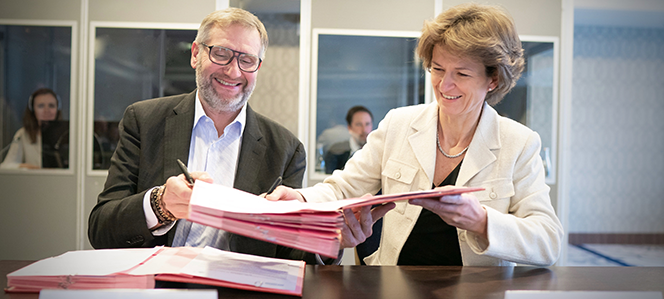
On 28 November 2019, ENGIE’s European Works Council, represented by secretary Robert Textoris and ENGIE’s CEO Isabelle Kocher, signed a joint declaration reflecting the commitment of the signatories to anticipating and supporting the economic, social and organisational changes resulting from the development of digital technologies across the Group.
Since 2016, ENGIE has put the energy transition at the core of its strategy and has initiated an in-depth transformation of its activities and organisations. Among the drivers of this transformation, digital technology figures most prominently. ENGIE is committed to ensuring that all its employees have a connection to the Group’s digital applications within 2 years.
For more than two years, the European Works Council has been working on a study to look more deeply into the concept of “digital transformation and digitisation” in the Group’s various areas of activity, and at the same time to identify the consequences of these transformations for employees.
It is in this context, that this frame of reference that is common to all of the Group’s entities and employees as regards support for digital issues has been defined.
- Maintaining and developing skills and training in digital tools
Anticipating changes and developing the skills of all employees are at the heart of ENGIE’s Human Resources policy and the concerns of the European Works Council members. Each digital project gives rise to an assessment of its impact in terms of jobs and skills.
- Supporting changing work patterns
The changes in work patterns that digital tools allow, such as teleworking, dynamic spaces, remote technical supervision systems and geolocation, have consequences for the way in which work is structured and for collective, individual and managerial relationships.
All of the Group’s entities, in conjunction with their employee representative bodies, routinely examine these impacts at the earliest possible stage in order to identify the most appropriate support measures to avoid any deterioration in working conditions and collective benefits.
- Confirming the importance of quality of life at work
The quality of life at work is a factor in the success of all the changes brought about by the development of digital technologies (information and communication tools, teleworking, dynamic spaces).
From this point of view, the changes related to new technologies must be taken into account in the implementation of the Quality of Life at Work policy at all levels of the Group’s structure, especially in terms of work-life balance, with particular attention to respect for the right to log off and implementing this right.
- Respecting individual freedoms
The signatories give a reminder that digital technologies (teleworking, geolocation, etc.) must be deployed in strict compliance with individual freedoms and European and national regulations on the protection of personal data.
- IT security and protecting intangible assets
While information and communication technologies open up new opportunities, they also entail risks for the company in terms of strategic and sensitive data.
Everyone in the company must be made aware of these risks and contribute to the implementation of the protective measures defined by management.
- Social dialogue in relation to digital transformation projects
The signatories are committed to ensuring that digital transformation projects are subject to transparent dialogue at the different levels of the Group’s organisational structure. For any digital transformation project, this means identifying and measuring, as early as possible, its possible impact on working conditions, jobs and skills, and taking the necessary measures to support them by anticipation.
They are also committed to requesting the opening of negotiations on a European framework agreement with the European Industry Federations starting in the second half of 2020.
“To become a leader in the zero-carbon transition, ENGIE has introduced digital technologies on a massive scale across its processes, energy production, big data and the Internet of things. This has helped us to become more innovative, to develop renewables and to improve the ways in which energy is used. The role that digital technologies play through the impact that they have on our work patterns therefore makes it a vital issue for a social dialogue appropriate for the 21st-century. The joint declaration that we are signing today with our European social partners creates a fully-fledged social dialogue roadmap for the Group and all of its entities as regards digital technologies. It will enable our 170,000 employees to make better use of digital tools and do so with confidence, while the Group will be able to continue to move forwards”, said Pierre Deheunynck, ENGIE’s Executive Vice President, in charge of Group Human Resources, Transformation, Corporate, Global Business Support, Global Care and Real Estate.






